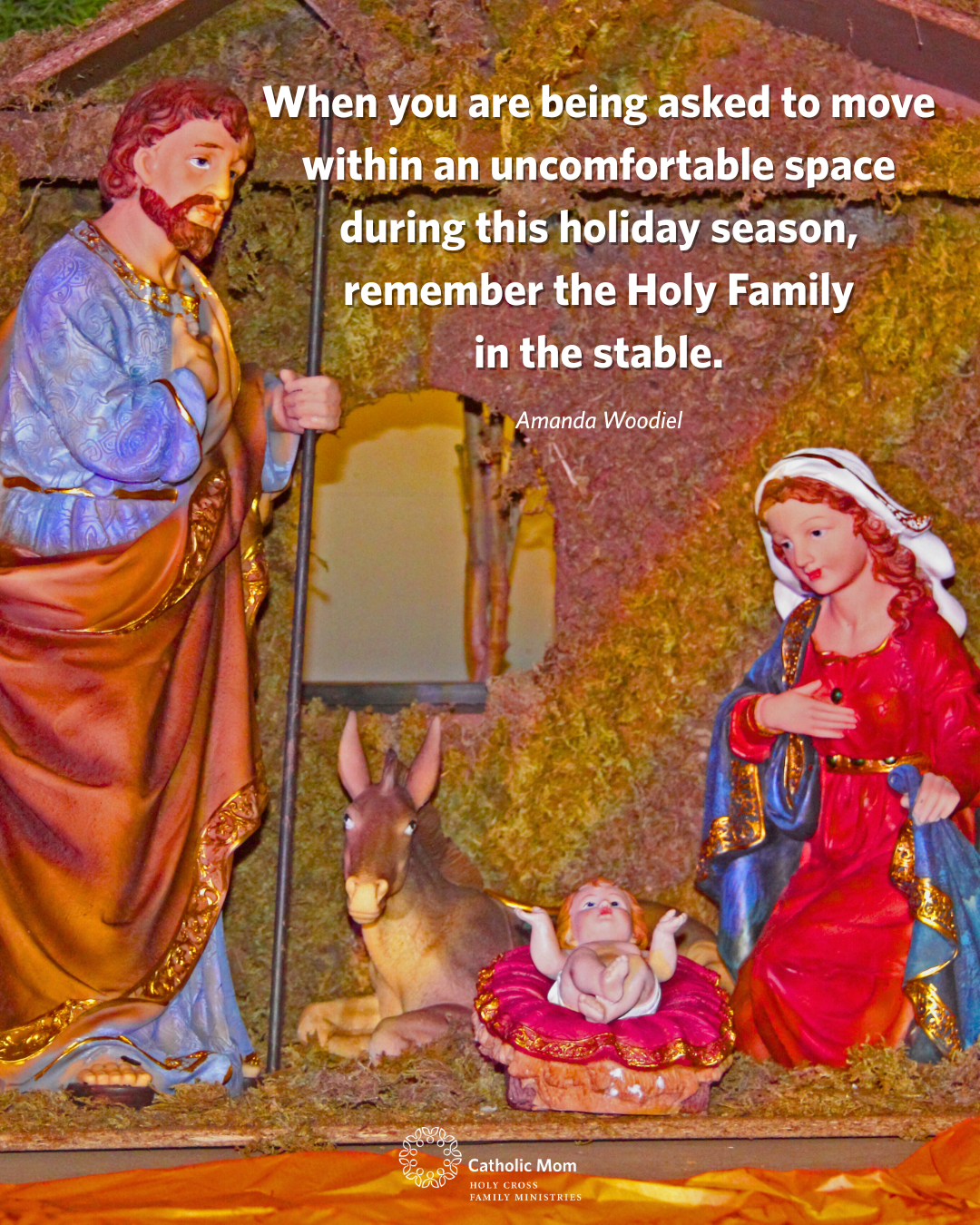
Amanda Woodiel reflects on entering into uncomfortable spaces as a way to embody the call to unity expressed in the Incarnation.
With holiday gatherings on the horizon, I imagine a lot of us will be heading into some uncomfortable spaces. We’ll travel in uncomfortable vehicles, arrive at physical locations that [perhaps] remind us of unpleasant history, make uncomfortable small talk, eat food that is not our preference, and, finally, sleep in uncomfortable beds.
Is it worth it? Why do we even go to all of this trouble?

Inhabiting an Uncomfortable Space
I’ve been pondering this myself in another context because I have been assigned to a ministry placement with the Office of Hispanic Ministry for our diocese for this academic year. At 47 years old, I’m in my first year of the MDiv program at Notre Dame, and it seems like I inhabit one uncomfortable space after another. First, I am back in the classroom with (mostly) twenty-somethings. I’m sitting in on formation nights where we talk about an integrated sexuality. I’m listening to lectures that sometimes I don’t understand and sometimes I don’t agree with. I’m participating in community-building events where we play goofy games and share our story. I can’t tell you the number of times I have thought, “I can’t believe I’m doing this.”
But on top of this, my ministry placement is meant to put me in an uncomfortable context. My role is to accompany Hispanic parishioners at my parish by attending their meetings and public celebrations. Not only am I unfamiliar with cultural practices and piety, my Spanish suffers from 25 years of disuse. The first event I attended was OCIA (catechesis for those seeking Baptism or Confirmation in the Catholic Church). I was supposed to meet our pastor there, along with a religious sister who had just been assigned to our parish. We three were going to sit in on the class together.
No one had told the leaders this ahead of time, and I arrived about ten minutes early, whereas Father and Sister arrived about fifteen minutes late. I attempted, in very broken Spanish, to explain my presence to the kind but confused leaders. I attempted to meet each person. I attempted to exude a welcoming, accompanying kind of presence … but what happened is that, halfway through, when they stopped class to eat a meal, I could not handle it anymore and fled. Unfortunately, my car was parked in by said participants, and I ended up going to the Church for benediction — in Spanish.
After this encounter and other similarly uncomfortable ones (though I never fled again), I started to wonder, “Why am I even entering into this uncomfortable space? Is it worth it?”
Why Should We Enter Uncomfortable Spaces?
The ultimate reason why we enter uncomfortable spaces is because God did it in the Incarnation. And why did He do so? So that we might be one with Him. Unity is such a pressing desire of the heart of God that He entered into our space in a new way. The Incarnation models for us the radical love and humility of God: a radical love and humility that we are called to imitate. Such a radical move contrary to our natural inclination toward comfortability requires supernatural help. It requires grace. We have to ask God to open our hearts to the possibility of change, the possibility of being wrong, and the possibility of being hurt.
In addition, as we move into uncomfortable spaces, it could be that certain issues arise, issues we weren’t expecting. We could find that there are wounds that need healing. We might find that we need to increase our awareness of other people’s concerns. We might discover ugly things about ourselves: that we prefer to talk rather than listen or teach rather than be the student. It’s by moving into these uncomfortable spaces that these things about ourselves, already present, are highlighted. But now we can attend to them in a purposeful way.
Is It Worth It?
Ultimately, though, the question of whether it’s “worth it” is left in the hands of God. We are called to be obedient, not to be successful, and I firmly believe that grace is in the obedience — that is, that grace comes when we obey what God asks us to do:
Have among yourselves the same attitude that is also yours in Christ Jesus, Who, though he was in the form of God, did not regard equality with God something to be grasped. Rather, he emptied himself, taking the form of a slave, coming in human likeness; and found human in appearance, he humbled himself, becoming obedient to death, even death on a cross. Because of this, God greatly exalted him and bestowed on him the name that is above every name. (Philippians 2:5-9)

When you are being asked to move within an uncomfortable space during this holiday season, remember the Holy Family in the stable. Remember Our Lord who had no stone upon which to lay His head. And, finally, remember that God works in ways we cannot see and trust that through obedience to His will, grace will rain down.
Share your thoughts with the Catholic Mom community! You'll find the comment box below the author's bio and list of recommended articles.
Copyright 2025 Amanda Woodiel
Images: Canva
About the Author

Amanda Woodiel
Amanda Woodiel is a Catholic convert, a mother to five children ages 14 to 6, a slipshod housekeeper, an enamored wife, and a “good enough” homeschooler who believes that the circumstances of life—both good and bad—are pregnant with grace. Her oldest son was diagnosed with cancer in the summer of 2022, which is providing plenty of opportunities to test that hypothesis.


.png?width=1806&height=731&name=CatholicMom_hcfm_logo1_pos_871c_2728c%20(002).png)
Comments